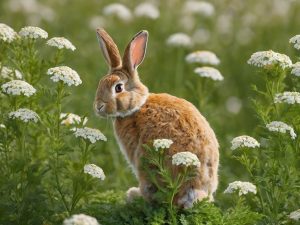Can Rabbits Enjoy Yarrow Flowers? Let’s Find Out!
Let’s Unravel the Yarrow Mystery
Yarrow, or Achillea millefolium in scientific lingo, is a perennial plant known for its lacy

So, Can Bunnies Munch on Yarrow Flowers?
Let’s cut to the chase – can your fluffy companion enjoy the delicate taste of yarrow flowers?
A Pinch of Yarrow is Just Right
Yarrow flowers can indeed be part of your rabbit’s diet, but remember, moderation is the key! Like any treat, these lovely blooms should be given in small amounts. Too much of a good thing can lead to an upset tummy.
What’s in it for the Bunny?
Now, let’s talk benefits. Yarrow flowers, when offered as an occasional treat, can add some variety to your rabbit’s menu. They bring a different flavor and texture to the table, which can be mentally stimulating for your furry friend. However, here’s the scoop – yarrow flowers aren’t nutritional powerhouses, so they shouldn’t replace the core items in your rabbit’s diet.
Handle with Care
While yarrow flowers are generally bunny-friendly when given in moderation, there are some things to keep in mind:
- Pesticides? No, Thanks: Make sure the yarrow flowers you offer to your rabbit are free from pesticides or any harmful chemicals. It’s safest to pick fresh flowers from your garden if you’re confident they’re pesticide-free.
- Watch for Allergies: Just like us, bunnies can have sensitivities or allergies. When introducing yarrow flowers, take it slow and keep a close eye on your rabbit’s reaction. If you notice any signs of allergies or tummy troubles, it’s best to skip yarrow.
- Variety is Key: Yarrow flowers are treats, not a meal replacement. Your rabbit’s primary diet should consist of high-quality
, fresh veggies, and a small portion of rabbit pellets.
Yarrow Flowers for Pet Rabbits
| Feature | Description | Reference |
|---|---|---|
| Can pet rabbits eat yarrow flowers? | Yes, in moderation. | [2][5] |
| Benefits of yarrow flowers | Yarrow has anti-inflammatory effects and has been studied for wound healing, digestive disorders, and more. It is also highly valued for its medicinal properties and is mainly consumed in the form of tea. The tea brewed from yarrow leaves helps in treating fever by stimulating perspiration owing to its antipyretic and diaphoretic actions. Refreshing yarrow tea is beneficial in promoting the digestion process due to its carminative nature and is used in curing diarrhea due to its antispasmodic trait. Yarrow has been used largely to treat a host of digestive problems like ulcers, and irritable bowel syndrome (IBS) symptoms such as abdominal pain, diarrhea, bloating, and constipation. It is also used as a natural wound healer. |
[1][4] |
| Nutrition of yarrow flowers | Yarrow contains 3-4% condensed and hydrolysable tannins; 0.3-1.4% volatile oils, mostly linalool, borneol, camphor, β-caryophyllene, 1,8-cineole, and sesquiterpene lactones composed of guaianolides, mainly achillicin (a proazulene), achillin, leucodin, and germacranolides (dihydroparthenolide, achillifolin, millefin); flavonoids (apigenin, luteolin, isorhamnetin, rutin); amino acids (alanine, histidine, leucine, lysine); fatty acids (linoleic, palmitic, oleic). |
[3][4][6] |
References:
- https://www.verywellhealth.com/yarrow-health-benefits-4586386
- https://www.sciencedirect.com/topics/agricultural-and-biological-sciences/achillea-millefolium
- https://www.ema.europa.eu/en/documents/herbal-report/draft-assessment-report-achillea-millefolium-l-herba-revision-1_en.pdf
- https://netmeds.com/health-library/post/yarrow-achillea-millefolium-health-benefits-uses-dosage-and-side-effects
- https://jaesj.journals.ekb.eg/article_279128_9feb49402631db3e46fb8de7c43448f5.pdf
- https://growitbuildit.com/yarrow-achillea-millefolium/
What if Yarrow Isn’t on the Menu Today?
Can’t find yarrow flowers or want to mix things up for your bunny? No worries; there are other rabbit-friendly treats to consider:
- Chamomile: Chamomile flowers are gentle and soothing, making them a favorite among rabbits.
- Calendula: These flowers provide both a burst of color and flavor that many bunnies enjoy.
- Rosemary: Fresh rosemary leaves are aromatic and can be a delightful addition to your bunny’s treat time.
- Lavender:
flowers offer a pleasant fragrance and can be given sparingly.
Answering Your Bunny Questions
Q1: Can rabbits munch on other parts of the yarrow plant, like leaves or stems?
A1: Stick to the flowers; the leaves and stems might be a bit tough for your bunny’s liking and digestion.
Q2: Are there specific yarrow varieties that are safer for rabbits?
A2: Stick to common yarrow types and avoid exotic or less-known varieties to play it safe.
Q3: How should you introduce yarrow flowers to your rabbit’s diet?
A3: Start small and watch for bunny approval. If your furry friend enjoys them without any fuss and shows no signs of allergies or tummy issues, you can keep offering them as an occasional treat.
In the End, It’s All About Balance
In a nutshell, yarrow flowers, when given in moderation and sourced from a pesticide-free environment, can be a charming addition to your rabbit’s diet. They provide variety and mental stimulation. However, they should never replace your rabbit’s main diet, which should consist of high-quality hay, fresh







Leave a Reply